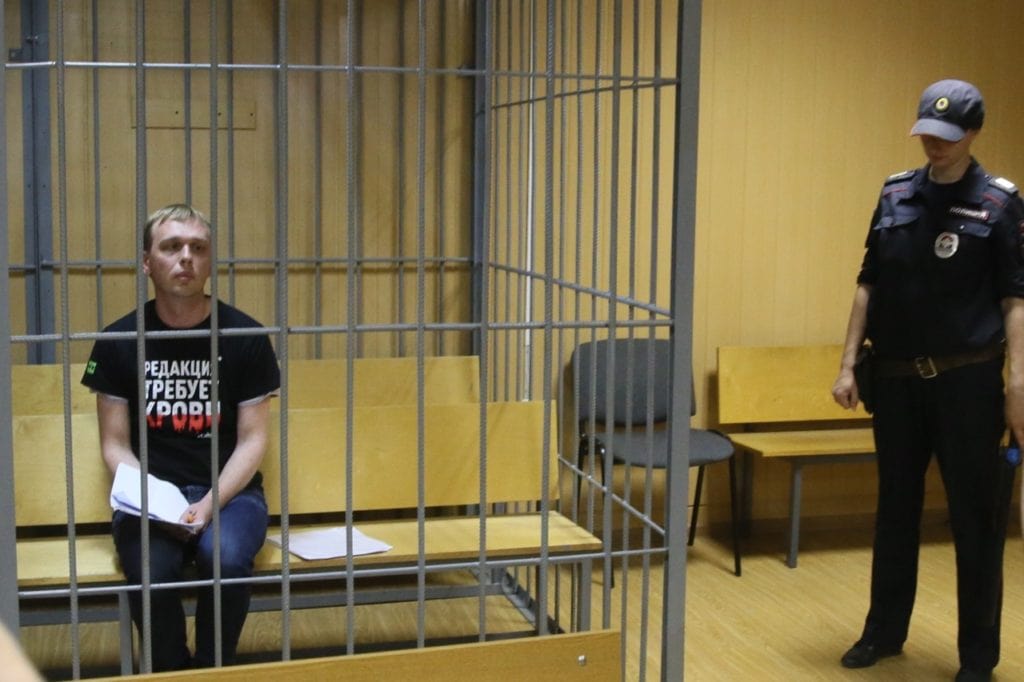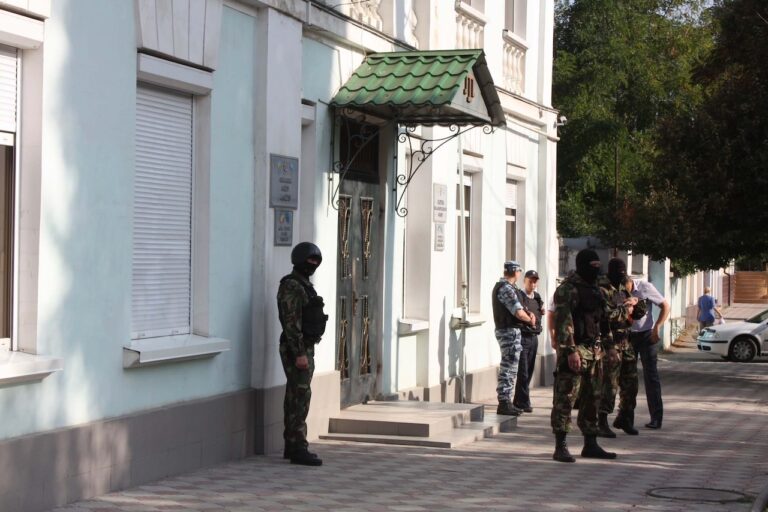Arrested on dubious drugs charges, well-known investigative journalist Ivan Golunov was beaten up and placed under house arrest, pending trial. If convicted on the charges against him, he faces between ten and 20 years in prison.
Ivan Golunov, a highly respected journalist for the independent Russian news website, Meduza, was arrested on dubious drugs charges in Moscow, Russia on 6 June 2019. On 8 June, he was placed under house arrest for two months, pending trial.
Golunov has been charged with intent to supply illegal drugs; if convicted, he faces between ten and 20 years in jail. He denies the charges and says that drugs allegedly found in his possession were planted by police officers. Meduza supports Golunov’s claim, saying that he was arrested because of his work.
Golunov, who has received numerous threats in recent months, is one of Russia’s best known investigative journalists. He has exposed political and financial corruption in Moscow’s political class and business sector. In January 2019, he wrote about Moscow Deputy Mayor Pyotr Biryukov’s relatives, who have amassed millions of dollars in city contracts; in June 2019, he shone the spotlight on Moscow’s ruthless loan sharks. According to Meduza, when Golunov was arrested, he was carrying out similarly sensitive investigative work (the details of which have yet to be revealed).
Golunov was arrested at approximately 2:40 PM on 6 June in Tsvetnoy Boulevard. According to the journalist, he was approached by two men in civilian clothes who grabbed him, pinned his arms behind his back and shoved him into a waiting patrol car. They only identified themselves as police officers after Golunov demanded to see a lawyer.
At Moscow’s Western Administrative District police station, police officers searched Golunov’s rucksack and claimed to have found a quantity of the drug mephedrone (a synthetic amphetamine). On hearing this, the journalist demanded to see a lawyer but says that he was brutally beaten instead.
Golunov was only allowed access to legal representation after spending 12 hours in custody. When a lawyer arrived, he asked for Golunov to receive medical attention for the injuries sustained during the beating; at first, this request was denied.
When a doctor was finally allowed to see Golunov, he said that the journalist had probably suffered broken ribs, concussion and a haematoma.
Whilst in custody, Golunov demanded that police officers take samples from his rucksack, hands and fingernails, so that a forensic analysis could show that he had never had any contact with the drugs that were allegedly discovered in his possession; the police refused. However, following a visit from public monitoring commission members, the tests were eventually carried out.
According to Golunov’s lawyer, by the time the journalist appeared in court, he had been kept in handcuffs for over 48 hours.
When news of Golunov’s arrest became public, journalists, rights organisations, friends and supporters protested in the streets and online. There were pickets in several cities across Russia, including one outside Moscow police headquarters where, as Human Rights Watch reported, ten protesters were detained. Russia’s Trade Union of Journalists and Media Workers issued a public letter calling for Golunov’s immediate release.
IFEX members also expressed outrage at the journalist’s arrest and mistreatment in custody.
Johann Bihr, head of the Eastern Europe and Central Asia desk for Reporters Without Borders (RSF), said: “The extremely strange behaviour of the police suggests that Ivan Golunov has been arrested on a trumped-up charge. Why would they otherwise deny him access to his lawyer and refuse to carry out decisive tests? If fabricated evidence really has been used to arrest a journalist who is so well known throughout Russia, this would mark a significant escalation in the harassment of the country’s independent media”.
Gulnoza Said, Europe and Central Asia Program Coordinator at the Committee to Protect Journalists (CPJ), said: “Russian authorities should immediately drop their charges against Ivan Golunov, release him, and investigate allegations of mistreatment of the journalist in police custody. Russia has a long history of politically motivated charges against independent reporters. Investigative journalism is treated as a crime where it ought to be viewed as a public service”.
Ricardo Gutiérrez, General Secretary of the European Federation of Journalists (EFJ), said: “We ask Moscow prosecutors to review the legality of police actions. Together with many prominent Russian journalists, we are convinced that Ivan Golunov is innocent. We believe that the main purpose of this police operation is to silence him and intimidate all journalists investigating the corruption of Russian officials”.
PEN America called on “the false accusations” against Golunov to be dropped, and said that they reflected “the Russian government’s long-standing practice of harassing its critics via both legalistic and clearly extra-legal means, which appear to have widened as regional elections are coming in September”.
The EFJ, alongside CPJ and Index on Censorship, co-signed an alert regarding Golunov’s case on the Council of Europe Platform for the Protection of Journalism.
The OSCE Representative on Freedom of the Media, Harlem Désir, also called on the Russian authorities to release Golunov. “Under no circumstances should media workers who investigate corruption or wrongdoing be targeted in retaliation for their work”, he said.
Meduza has publicly thanked all those who protested on Golunov’s behalf. It says it will work with other news outlets to continue the investigation that the journalist started. Meduza is asking news outlets to support Golunov by republishing his work; with that end in mind, it has released all of the journalist’s writing for Meduza under a Creative Commons license.



